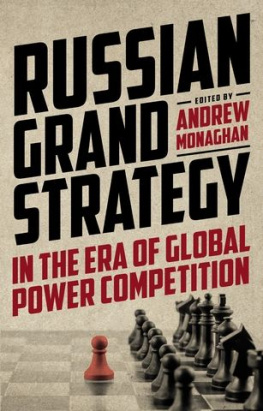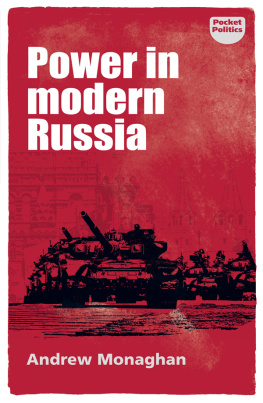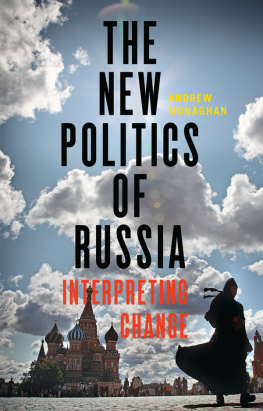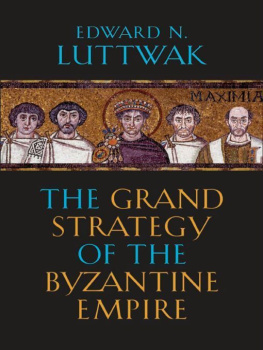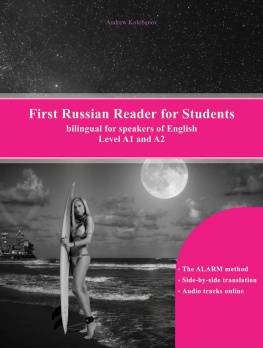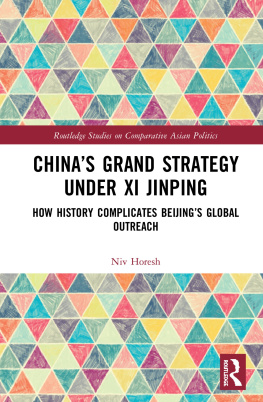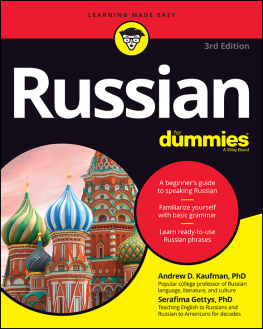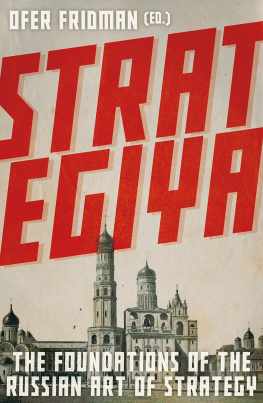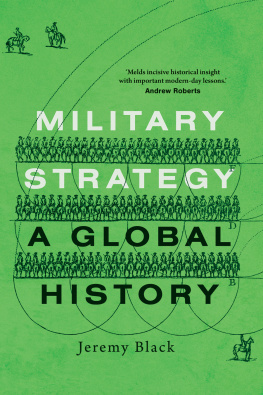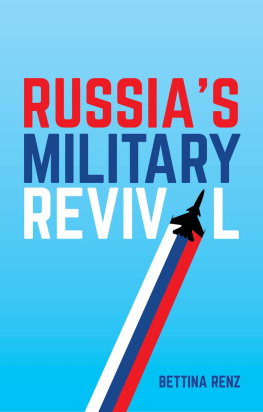Andrew Monaghan - Russian Grand Strategy in the era of global power competition (Russian Strategy and Power)
Here you can read online Andrew Monaghan - Russian Grand Strategy in the era of global power competition (Russian Strategy and Power) full text of the book (entire story) in english for free. Download pdf and epub, get meaning, cover and reviews about this ebook. year: 2022, publisher: Manchester University Press, genre: Politics. Description of the work, (preface) as well as reviews are available. Best literature library LitArk.com created for fans of good reading and offers a wide selection of genres:
Romance novel
Science fiction
Adventure
Detective
Science
History
Home and family
Prose
Art
Politics
Computer
Non-fiction
Religion
Business
Children
Humor
Choose a favorite category and find really read worthwhile books. Enjoy immersion in the world of imagination, feel the emotions of the characters or learn something new for yourself, make an fascinating discovery.
- Book:Russian Grand Strategy in the era of global power competition (Russian Strategy and Power)
- Author:
- Publisher:Manchester University Press
- Genre:
- Year:2022
- Rating:3 / 5
- Favourites:Add to favourites
- Your mark:
- 60
- 1
- 2
- 3
- 4
- 5
Russian Grand Strategy in the era of global power competition (Russian Strategy and Power): summary, description and annotation
We offer to read an annotation, description, summary or preface (depends on what the author of the book "Russian Grand Strategy in the era of global power competition (Russian Strategy and Power)" wrote himself). If you haven't found the necessary information about the book — write in the comments, we will try to find it.
Russian Grand Strategy in the era of global power competition (Russian Strategy and Power) — read online for free the complete book (whole text) full work
Below is the text of the book, divided by pages. System saving the place of the last page read, allows you to conveniently read the book "Russian Grand Strategy in the era of global power competition (Russian Strategy and Power)" online for free, without having to search again every time where you left off. Put a bookmark, and you can go to the page where you finished reading at any time.
Font size:
Interval:
Bookmark:
Russian Grand Strategy in the era of global power competition

Russian Strategy and Power
Series editors : Andrew Monaghan and Richard Connolly
Editorial board
Julian Cooper, OBE
Emily Ferris
Tracey German
Michael Kofman
Katri Pynnniemi
Andrei Sushentsov
Previously published
Germany's Russia problem: The struggle for balance in Europe
John Lough
Russian Grand Strategy in the era of global power competition
Edited by Andrew Monaghan
Manchester University Press
Copyright Manchester University Press 2022 While copyright in the volume as a whole is vested in Manchester University Press, copyright in individual chapters belongs to their respective authors, and no chapter may be reproduced wholly or in part without the express permission in writing of both author and publisher. Published by Manchester University Press Oxford Road, Manchester M13 9PL www.manchesteruniversitypress.co.uk British Library Cataloguing-in-Publication Data A catalogue record for this book is available from the British Library ISBN978 1 5261 6461 2hardback ISBN978 1 5261 6462 9paperback First published 2022 The publisher has no responsibility for the persistence or accuracy of URLs for any external or third-party internet websites referred to in this book, and does not guarantee that any content on such websites is, or will remain, accurate or appropriate. Cover design by James Hutcheson Typesetby New Best-set Typesetters Ltd
Contents
- Florence Gaub
- Ian Hill
- Andrew Monaghan
- Alexander J. Kent
- Michael B. Petersen
- Charles Bartles
- Richard Connolly
- Nazrin Mehdiyeva
- Julian Cooper
- Andrew Monaghan
Maps
Figures
Tables
Charles Bartles is an analyst and Russian linguist at the Foreign Military Studies Office at Fort Leavenworth, Kansas.
Richard Connolly is Director of Eastern Advisory Group and an Associate Fellow at the Royal United Services Institute in London.
Julian Cooper is Professor Emeritus at the Centre for Russian, Eurasian and Eastern European Studies at the University of Birmingham.
Florence Gaub is Deputy Director of the European Institute for Security Studies.
Ian Hill is a former two-term New Zealand Ambassador to Russia.
Alexander J. Kent is Reader in Cartography and Geographic Information Science at Canterbury Christchurch University.
Nazrin Mehdiyeva is an independent energy consultant.
Andrew Monaghan is Director of the Russia Research Network and a Senior Associate Fellow at the Royal United Services Institute in London.
Michael B. Petersen is Director of the Russia Maritime Institute at the US Naval War College.
Charles Bartles and Michael B. Petersen are writing in a personal capacity.
Florence Gaub
There is an unwritten rule among Western writers on international politics: any piece on strategy has to contain a quote from at least one of the classics Chinese General Sun Tzu, Prussian General von Clausewitz, or Italian diplomat Machiavelli. And most pieces on Russia, too, will inevitably resort at some point to quotes preferably from British statesman Winston Churchill or Prussian Chancellor von Bismarck. Quotes serve as a visible reminder that the topic at hand is not just historic and important, but a difficult one even for those wise men (seldom women) who preceded us. Strategy and Russia tick all these boxes: they are, to most Western policy makers and observers, questions that are historic, important, and difficult to crack.
Let us begin with strategy. In theory, we all know what it is: a detailed plan for achieving success. A vision combined with action. The bridge between means and ends. A tool taken from the military and applied to international politics and business.
But in practice, strategy is much harder to grasp. The fact that some dictionaries define it as partly an art hints at the problem: there is something creative, ingenious, and elusive about strategy. This is because strategy has by definition aspirational elements in it that are the result of visions, dreams, and hopes hardly hard facts, but instead, almost emotional components that are normally rare in public policy documents. Yet strategy also has a creative element because it is, as Clausewitz reminds us, by definition a response to limited resources. With unlimited resources, one wouldn't need a strategy. To use these resources in the best possible way, one needs creative ideas on how to maximise their contribution to achieving the vision and how practically to order priorities.
To make matters more complex, strategy is not a static term: depending on context, it differs in scale and complexity and can mean policies, objectives, tactics, goals, programmes, and more. Strategies can take all kinds of shapes: a company might have a strategy to increase its customer base, a government can have strategies to reduce poverty, and individuals might have financial strategies. When it comes to states, we call it Grand Strategy: a strategy that combines different policy areas military, diplomatic, economic, and more to achieve a long-term national goal. In this type of strategy, security matters normally take precedence over other elements but here, too, there are exceptions.
But having a strategy a vision of what is to be achieved and how is not enough: actions need to follow suit. That is why strategy is not just a basic document (such as the EU's Global Strategy
Strategy is also not just about oneself; in fact, we often need it most when our visions are in competition with those of others. Good strategy is dynamic, interactive, and competitive. That is why recognising the strategy of others is crucial to know what they will attempt to achieve. Strategy spotting can be easy if states are upfront about it, but they might not necessarily have an interest in informing the world of their intentions in order to capitalise on the effect of surprise. This is all the more the case if we do not invest sufficient effort in understanding that strategy, or even ignore it altogether.
Close observation of action, interpretation of statements, and, most importantly, empathy, will help us understand whether we are watching opportunistic manoeuvrings or indeed actions that are part of a larger strategy. Strategy therefore requires vision, planning, adjustment, observation of others, creativity, and empathy most of which do not come easy to bureaucracies.
From a European point of view, this also applies to any dealings with Russia. And just as strategy is not easy to grasp, so is Russia as shown by the (in)famous references to Winston Churchill's remarks about riddles, mysteries, and enigma. That this hoary old quote is still in wide circulation shows how little European officials feel they understand Russia.
Relations between European Union member states and Russia have been cooling since the mid 2000s. Stagnating relations were given a jolt by President Putin's 2007 Munich Security Conference speech in which he not only pushed back strongly against the international system as he saw it, but also indirectly accused Europeans of arrogance. While the war with Georgia in 2008 cooled temperatures further, it was the occupation of parts of Ukraine in 2014 that led to a suspension of almost all relations.
While Europe might not have an explicit Russia strategy (as it has strategies on the Baltic Sea region, cooperation in the Indo-Pacific, or Central Asia), it has formulated what it would like its relations with Russia to be. This is laid out in its Global Strategy of 2016:
Next pageFont size:
Interval:
Bookmark:
Similar books «Russian Grand Strategy in the era of global power competition (Russian Strategy and Power)»
Look at similar books to Russian Grand Strategy in the era of global power competition (Russian Strategy and Power). We have selected literature similar in name and meaning in the hope of providing readers with more options to find new, interesting, not yet read works.
Discussion, reviews of the book Russian Grand Strategy in the era of global power competition (Russian Strategy and Power) and just readers' own opinions. Leave your comments, write what you think about the work, its meaning or the main characters. Specify what exactly you liked and what you didn't like, and why you think so.

